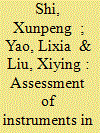|
|
|
Sort Order |
|
|
|
Items / Page
|
|
|
|
|
|
|
| Srl | Item |
| 1 |
ID:
150702


|
|
|
|
|
| Summary/Abstract |
Renewable off-grid solution plays a critical role in supporting rural electrification. However, off-grid Renewable Energy (OGRE) project financing faces significant challenges due to limited financing access, low affordability of consumers, high transactions costs and etc. Various supporting instruments have been implemented to facilitate OGRE investment. This study assesses the effectiveness of those instruments with a framework consists of three dimensions: feasibility, sustainability and replicability. The weights of each dimension in the framework and the scores of each instrument are assessed by expert surveys based on the Delphi method. It is suggested that all the three dimensions should be taken into consideration while assessing the instruments, among which feasibility and sustainability are considered as the most important dimensions in the assessment framework. Furthermore, the top-5 most effective instruments in facilitating OGRE investment are local engagement in operation and maintenance, loan guarantee, start-up grant, end user financing, and concessional finance. Developing countries that need to increase electrification, such as most of the ASEAN member states, could use these top scored instruments despite of their limited amount of public finance.
|
|
|
|
|
|
|
|
|
|
|
|
|
|
|
|
| 2 |
ID:
128406


|
|
|
|
|
| Publication |
2014.
|
| Summary/Abstract |
This study aims to examine how China's energy security has changed over 30 years of reform and the opening period. It constructs a 4-As quantitative evaluation framework-the availability of energy resources, the applicability of technology, the acceptability by society, and the affordability of energy resources. The quantitative results show that China's energy security was at its best during the sixth FYP period (1981-1985), but then deteriorated until it hit higher levels between 1995 and 2005. However, it was still lower than the level reached during the sixth FYP period. During the eleventh FYP period (2006-2010), the energy security situation deteriorated again. Differences in policy priority over the study period appear to affect the country's energy security status. This study suggests that China needs to develop renewable energy resources on a large scale and pay more attention to emissions control to reverse the downward trend in energy security.
|
|
|
|
|
|
|
|
|
|
|
|
|
|
|
|
| 3 |
ID:
137689


|
|
|
|
|
| Summary/Abstract |
This paper is a subsequent study of China's energy security situation which concludes that China's energy security has not improved over 30 years of economic reform. The objective of the study is to explore qualitatively why the energy security situation has not improved. To answer the ‘why’ question, the study opens up a new perspective by analyzing the relationship between energy security and energy policies from the macroeconomic reform perspective. This study discusses major reforms that took place over 30 years. It is found that China's macroeconomic reform has restricted the formation of China's energy policies and determined its energy security situation. In essence, China's energy policies are only a reaction to the macroeconomic measures. In other words, China's energy policies are not originally intended to improve energy security, but passive reactions to China's macroeconomic reform. This explains why China did not improve its energy security situation despite 30 years of reform.
|
|
|
|
|
|
|
|
|
|
|
|
|
|
|
|
|
|
|
|
|